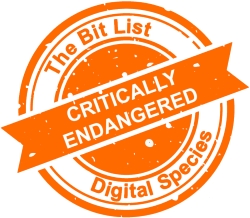Open Source Intelligence Sources of Current Conflicts
 |
||
|
Open source intelligence produced, collected and analysed from publicly, openly available social media and web content with the purpose of answering a specific intelligence question and that supports crowd-sourced investigation and fact-checking to verify or refute claims of state agencies and rebel groups in the context of current political or military conflict. |
||
|
Digital Species: Legal Data |
Trend in 2023:
|
Consensus Decision |
|
Added to List: 2019 |
Trend in 2024:
|
Previously: Critically Endangered |
|
Imminence of Action Action is recommended within twelve months, detailed assessment is a priority. |
Significance of Loss The loss of tools, data or services within this group would impact on people and sectors around the world. |
Effort to Preserve | Inevitability It would require a major effort to prevent or reduce losses in this group, possibly requiring the development of new preservation tools or techniques. |
|
Examples Social media sources relating to current conflicts, such as in Yemen or Syria. |
||
|
‘Practically Extinct’ in the Presence of Aggravating Conditions Loss of authenticity; lack of preservation agency; limited or no digital preservation capability; Uncertainty over IPR or the presence of orphaned works. |
||
|
‘Endangered’ in the Presence of Good Practice Offline backup captured by the journalist or investigating authority. |
||
|
2023 Review This entry was added as a subset in 2019, as part of a broader ‘Open Source Intelligence Sources’ which the Jury split into three elements, relating to current, recent and historic sources. This entry relates in particular to materials relating to current and ongoing conflicts. Social media companies have a policy to take down or suppress content that they consider to be propaganda for terrorist groups. This has had the unintended consequence of deleting or suppressing content that was being used in open source investigation or fact-checking for journalistic or judicial purposes, and which may therefore be an impediment to refutation or prosecution. However, a new generation of cloud-based services, such as Hunchly, have emerged in the last few years, which allow investigators to copy and stabilize content to private accounts in the process of investigating it: so, the ethical requirements of social media companies and the integrity of the investigation are both served. The 2021 Jury noted that such content stays at risk, and the process of investigation is slower than algorithmic deletion. Nonetheless, there is a notable difference in the investigation of current conflicts than historic ones where evidence has been lost. The 2022 Taskforce identified a trend towards even greater risk based on the increased significance of crowd-sourced investigations and fact-checking in light of ongoing global conflicts that include (but are not limited to) those in Ukraine. The 2023 Council agreed with the Critically Endangered classification with the overall risks remaining on the same basis as before (‘No change’ to trend). The 2023 Council also added clarification to the meaning of ‘open source’ for this entry, to explain its meaning in relation to intelligence openly available online, noting that open source can also refer to a specific software or content licence that permits limited uses of IP so this distinction would be helpful for readers. |
||
|
2024 Interim Review These risks remain on the same basis as before, with no significant trend towards even greater or reduced risk (‘No change’ to trend). The Council acknowledge the continuing challenge of ensuring the preservation of complete and accurate resources given that: platform owners continue to be obliged to remove content that violates community standards; copyright and ownership increasingly hinders capture/preservation of the open source materials; and with the rise in fakes, preservationists must attend to standards for legal admissibility and authentication which vary from one jurisdiction to another. |
||
|
Additional Comments Preservation is important for social context and may be picked up inadvertently in other ways - but is ambiguous about who has ultimate responsibility for collecting and preserving this. Case Studies or Examples:
See also:
|
||





































































































































